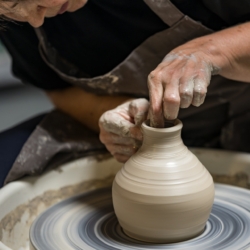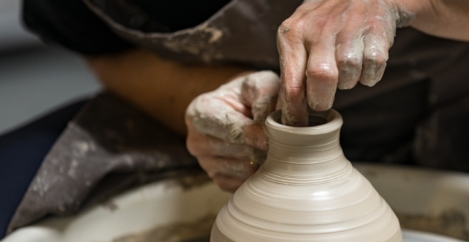September 2, 2024
Arts and crafts boost personal wellbeing more than work, study finds
 A new study suggests that engaging in arts and crafts activities can significantly enhance personal wellbeing, offering greater benefits than traditional employment. The research, conducted by a team from Anglia Ruskin University and published in the journal Frontiers in Public Health, found that activities like pottery, painting, knitting, and woodworking can increase life satisfaction, happiness, and the sense that life is worthwhile. These findings suggest that arts and crafts, often seen as mere hobbies, could be a powerful tool for improving mental health and wellbeing on a broad scale.
A new study suggests that engaging in arts and crafts activities can significantly enhance personal wellbeing, offering greater benefits than traditional employment. The research, conducted by a team from Anglia Ruskin University and published in the journal Frontiers in Public Health, found that activities like pottery, painting, knitting, and woodworking can increase life satisfaction, happiness, and the sense that life is worthwhile. These findings suggest that arts and crafts, often seen as mere hobbies, could be a powerful tool for improving mental health and wellbeing on a broad scale.
The study analysed data from the Taking Part Survey, a large-scale UK household survey conducted between 2019 and 2020. The survey included responses from 7,182 adults, focusing on their engagement with creative arts and crafting (CAC) activities. The researchers aimed to determine whether participation in CAC could predict subjective wellbeing and loneliness, even when controlling for various sociodemographic factors such as age, gender, health, and employment status.
It found that individuals who engaged in CAC activities reported significantly higher levels of life satisfaction, happiness, and a sense that life is worthwhile compared to those who did not. This was true even after accounting for other factors known to influence wellbeing, such as socioeconomic status and general health. Interestingly, the positive effects of CAC on life satisfaction were more substantial than the effects of living in a less deprived area—a factor traditionally associated with higher wellbeing.
Doing what works
The study’s authors argue that CAC could be an effective public health tool, offering a low-cost and accessible means to enhance wellbeing across diverse populations. “Engaging in arts and crafts can provide a sense of purpose and fulfillment that goes beyond what many people experience in their day-to-day work,” said Dr. Helen Keyes, the lead author of the study. “Our research shows that these activities are not just enjoyable but can actually make a significant difference in how people perceive their lives.”
The study also sheds light on why CAC might be so effective in boosting wellbeing. Many arts and crafts activities require focus and mindfulness, which can help individuals disengage from negative thoughts and stress. This focus on the task at hand can lead to a state of “flow,” a highly rewarding mental state that has been linked to increased happiness and life satisfaction.
One of the most striking aspects of the study is the comparison between the wellbeing benefits of CAC and traditional employment. While being employed is often associated with higher wellbeing, the study found that CAC activities had an even greater impact on participants’ sense that life is worthwhile. This finding challenges the conventional wisdom that work is the primary source of life satisfaction and suggests that creative activities could play a more central role in enhancing personal wellbeing.
Moreover, the study suggests that while work did contribute to increased happiness, the effect was smaller than that of engaging in CAC. This suggests that the fulfilment derived from creative activities may be more profound and lasting than the satisfaction obtained from work.
However, the study did find that CAC activities did not significantly reduce anxiety or loneliness, two key components of mental health. The researchers speculate that this may be because many arts and crafts activities are solitary pursuits, which, while fulfilling, do not necessarily address the need for social connection.
The implications of this research are far-reaching, particularly in the context of public health and social policy. Given the accessibility and low cost of most CAC activities, promoting these practices could be an effective way to improve wellbeing at a population level. Public health initiatives could include workshops, community centres, and online platforms that encourage people to take up arts and crafts as a regular part of their lives.
For individuals, the findings suggest that incorporating arts and crafts into daily routines could provide a meaningful boost to overall happiness and life satisfaction. Whether it’s picking up a paintbrush, knitting needles, or woodworking tools, these activities offer more than just a way to pass the time—they are a pathway to a richer and more fulfilling life.
The study concludes that, while work is undoubtedly important, creative activities can have an even greater impact on personal wellbeing.
















